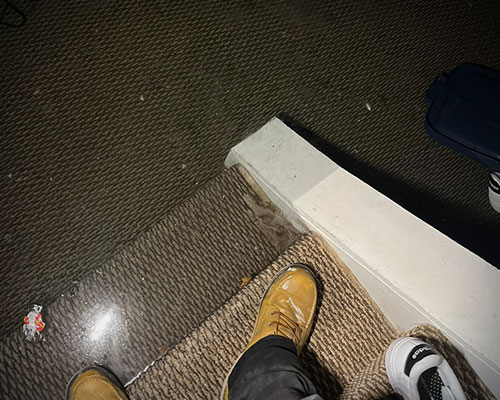Water Damage Category 1: Clean Water
Clean (so-called "sanitary") Water Category 1 and air are the sources of our life. We wash our hands with water, eat it, and so on. But let's look at what is considered clean water and what other options there are. Let's figure out what affects water pollution and what damage it can cause.
What is Clean Water?
Clean water damage category refers to a classification used in the restoration and remediation industry to categorize the source of water damage. Clean water damage category refers to water that originates from a clean or sanitary source and poses no substantial risk to human health if consumed or exposed to. Examples of clean water sources include broken water supply lines, tub or sink overflows with no contaminants, and rainwater.
In the context of water damage restoration, clean water damage is typically the least severe category, as it does not contain harmful contaminants. However, it still requires prompt and thorough mitigation to prevent further damage and mold growth.
How Can Clean Water Become Contaminated?
Everyone should know how water can get dirty. At least in order to prevent ourselves from getting sick. Sometimes, the clean water can get a little impure after a while if it picks up some dirt. For example, bacteria from sewage or drains and viruses from chemicals of everyday use such as detergent or pesticide. Such water is called moderately polluted. We classify such gray contaminated water as the 2nd category of water. But the worst thing is that clean water can get polluted in the worst possible ways. For instance, toxins from industrial waste or household items, biomaterials such as feces or blood, and even radioactive residues from radioactive substances. It is crucial to be aware of how this happens to stop. It is important to ensure that our water sources remain clean and safe for everyone.
Flood Damage Can Contaminate Clean Water in Several Ways
Let's chat about how flood damage can mess with our clean water in a bunch of ways. First up, sewage can overflow during floods and find its way into homes - not fun at all. Drains can also take a hit, getting damaged and letting sewage leak into the mix. And let's not forget about septic tanks; they can overflow or get damaged, too, adding to the mess. This is how groundwater is most often contaminated. Such complex contaminants cannot be removed from groundwater with a simple filter. In many cases, this makes the water become dark. It is used to say such water is highly contaminated. Do not forget also about the risk of water contamination through the penetration of such mixtures into pipes damaged by rust. Plus, floodwaters can bring in all sorts of chemicals from places like basements or garages, making our clean water not so clean anymore. It's important to be aware of these risks during floods and take steps to protect our water and our homes.
What Are the Causes of Clean Water Damage?
Understanding the causes of clean water damage is crucial for property owners and restoration professionals to effectively address and mitigate its impact. Here are some common causes of clean water damage:
- Plumbing Failures: Leaking or burst pipes, fittings, or plumbing fixtures such as sinks, toilets, and bathtubs can result in clean water damage.
- Appliance Malfunctions: Malfunctioning appliances like washing machines, dishwashers, or refrigerators with water lines can cause clean water damage if the supply lines rupture or leak.
- Roof Leaks: Damaged or deteriorating roofs can allow rainwater to enter the structure, causing clean water damage to ceilings, walls, and floors.
- HVAC System Issues: Faulty air conditioning units or heating systems with leaking pipes or condensation pans can contribute to clean water damage.
- Overflowing Fixtures: Accidental overflow of bathtubs, sinks, or toilets due to human error or clogs can result in clean water damage.
- Heavy Rainfall: Severe weather events such as heavy rainfall or storms can lead to clean water damage if water enters the property through windows, doors, or cracks in the foundation.
- Snowmelt: Melting snow can cause clean water damage if it seeps into the property through improperly sealed windows or doors or through roof leaks.
- Foundation Cracks: Cracks in the foundation or basement walls can allow groundwater to seep into the structure, resulting in clean water damage.
These are just a few examples of the potential causes of clean water damage. It's essential to address any water-related issues promptly to prevent further damage and mold growth.
Clean Water Damage Prevention Tips
To ensure that neither your home nor the water you use is damaged, read these tips from Flood Damage Pro experts. First and foremost, do not neglect your appliances. Give them some care by checking for leaks and malfunctions. This includes the refrigerator, dishwasher, and the washer. Check those supply lines as well. If you see any cracks or rust, this is a sign to change it so that you can prevent water damage. Make sure your water filters are new and in good condition. Don't overlook your gutters and downspouts or rainwater drains. Make sure that the water flows as far as possible from the well if you use it for water intake. Also, regarding the plumbing problems, don't procrastinate; fix those leaky faucets before they become a major issue. In general, in order to drink clean water in Washington DC, it is enough to at least monitor the water filters and the newness of the plumbing. Stay dry and happy!
In case your water is completely out of control in Washington, DC:
Our service professionals are experienced in doing all kinds of water damage cleanup. We realize that the process of handling water damage can appear stressful and overwhelming, and it is for that reason that we aim to provide the fastest and most effective services to speed things up for our customers. If you live in the city of Washington, DC, and you need a professional water damage restoration service, do not hesitate to contact Flood Damage Pro.

Call now for an on-site evaluation and inspection for emergency services


On every job
CALL FLOOD DAMAGE PRO
